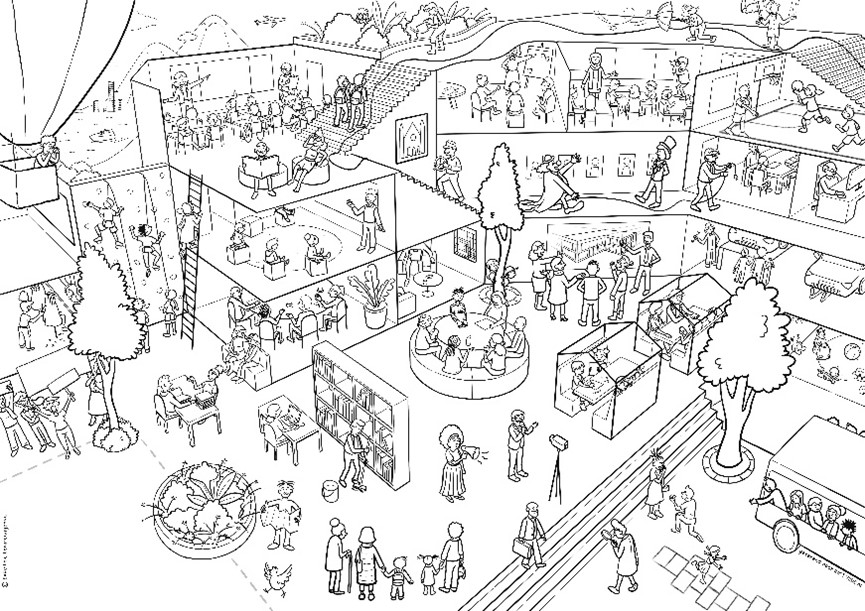Towards diversity-responsive teacher educators: reflections of a professional development initiative

Creative research as a starter for professional dialogue
February 19, 2024Towards diversity-responsive teacher educators: reflections of a professional development initiative

In the past year, a fruitful collaboration took place between a teacher educator, Ann, and a doctoral researcher, Benjamin, regarding a professional development initiative (PDI) on teacher educators’ responsiveness to diversity. To inspire others to replicate the PDI we share some reflections from both perspectives.
Context
Diversity-responsive education addresses the fact that current educational systems still do not manage to serve all; as such, it takes into account all human diversity in order to facilitate effective learning for all and contribute to the reduction of social inequality (Ponet, et al., 2023). As we believe that a single teacher has the potential to foster change to the educational system, we also believe that someone who prepares the next generation of teachers has a crucial role to enhance diversity-responsive education (Vanderlinde et al., 2021). However, Benjamin’s doctoral research project uncovered how many higher education-based teacher educators in Flanders feel insecure and experience barriers to set up diversity-responsive practices (Ponet et al., under review). Hence, the need for a tailored professional development initiative (PDI) arose.
For the PDI’s design, the design principles for effective teacher educator professional development were taken into consideration. These are formulated by the InFo-TED network in their book Teacher Educators and their Professional Development: Learning from the Past, Looking to the Future (Tack et al., 2021). Additionally, to make the PDI as tailored as possible, a participatory process was chosen. Two teacher educators were appointed within the participating higher education college who brainstormed with the research team on concrete content and pedagogical methods, and co-facilitated the implementation of the PDI.
Ann’s reflections as a facilitator – teacher educator
Prior to this collaboration, I was already involved in an internal research project on teacher educators’ competences to approach diversity. After my colleague and I had mapped the needs and accomplishments of our teacher education department regarding the matter, we started exploring ways to enhance the broader team’s knowledge and skills on approaching diversity. Consequently, it was a great opportunity to join Benjamin’s research plans.
The collaboration allowed us to expand our own knowledge base and to take on a supporting role during the different steps of the process. I saw myself as a supportive facilitator of the PDI: I was not expected to be the sole person to guide, lead, and coach my colleagues, yet I was still involved in selecting the content and approach. I think it is valuable to have an internal staff member being part of the PDI process as you are able to bring in nuances a researcher would not detect immediately, such as the present knowledge, thresholds, the inner sensitivities, the needs… On the other hand, it sometimes felt strange or delicate to open the conversation about diversity-related topics with colleagues and try to direct them towards a shared framework, since I am no program head. My advice to fellow teacher educators would be to make sure to involve the managing board in the PDI: to not only update them on what you are doing but preferably let them take part in the PDI, or a slim-downed version of it, as well. This is the only way the content will really spread into the ‘DNA’ of your organisation.
Benjamin’s reflections as a facilitator – researcher
During my PhD research I already encountered many teacher educators, which made me aware of their general needs regarding diversity-responsive education and the challenging and context-specific circumstances that make pursuing evidence-informed PDI difficult (e.g., lack of time, lack of collegial discussion). In addition, despite my teaching degree,I felt a lack of legitimacy to design and facilitate a PDI for teacher educators on my own, since I was working as a full time researcher. Therefore, in order to grasp institutional nuances and convince potential participants of the humble position as a young researcher towards their practical experience of many years, I sought strong alliances.
The collaboration allowed me to learn from experienced teacher educators, giving me direct feedback about existing micropolitics and (un)successful PDI’s from the past. Since this PDI also functioned as an intervention study within my doctoral project, I took the lead role in the process, ensuring both the data collection and PDI implementation. At first, I had some difficulties with the dual role of researcher and facilitator. I was used to keeping some distance from research participants, but in this process this was unpossible. However, as soon as the PDI started, I facilitated as I used to do as a teacher: engaged, compassionate, structured, and flexible. Afterwards, these character traits, together with my capacity to model the creation of a safe environment, were identified as vital aspects of the PDI. I believe that not being a part of the institution made it easier for me to allocate time towards creating more safety among colleagues, an often taken-for-granted precondition for PDI’s.
Concluding remarks
The preliminary findings of the intervention study regarding this PDI on teacher educators’ responsiveness to diversity suggest a clear positive impact. First, participating teacher educators felt more aware about the diversity-responsive practices they could implement thanks to the introduction of a conceptual framework that functioned as a common lens to analyse and acknowledge their current practices. Second, participants implemented more diversity-responsive practices due to increased confidence, enhanced connections with colleagues and expanded knowledge and skills sets. Third, because of the permanent pre-scheduled incentive they received to invest in the PDI, their pre-existing critical stance was reinforced, extending even into their personal lifes. We strongly believe the fruitful collaboration between teacher educators and researchers made these outcomes possible. We hope it inspires other teacher educators institutions to do the same!
References
Ponet, B., De Clerck, A., Vantieghem, W., Tack, H., & Vanderlinde, R. (2023). Uncovering the role of teacher educators in the reduction of inequalities in education: A critical discourse analysis. Social Psychology of Education. https://doi.org/10.1007/s11218-023-09818-7.
Ponet, B., Vantieghem, W., Tack, H., & Vanderlinde, R. (in review). Diversity-responsive teacher educators in Flanders.
Tack, H., Vanderlinde, R., Bain, Y., Kidd, W., O’Sullivan, M., & Walraven A. (2021). Learning and design principles for teacher educators’ professional development. In R. Vanderlinde, K. Smith, J. Murray & M. Lunenberg (Eds.), Teacher Educators and their Professional Development: Learning from the past, looking for the future (pp. 51-64). Routledge.
Vanderlinde, R., Smith, K., Murray, J., Lunenberg, M., (2021). Teacher educators and their professional development: Learning from the past, looking for the future. In R. Vanderlinde, K. Smith, J. Murray & M. Lunenberg (Eds.). Teacher educators and their professional development: Learning from the past, looking for the future (pp. 158–171). Routledge.




